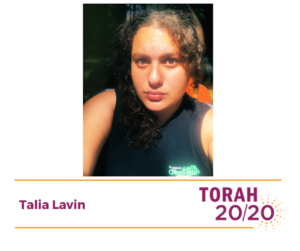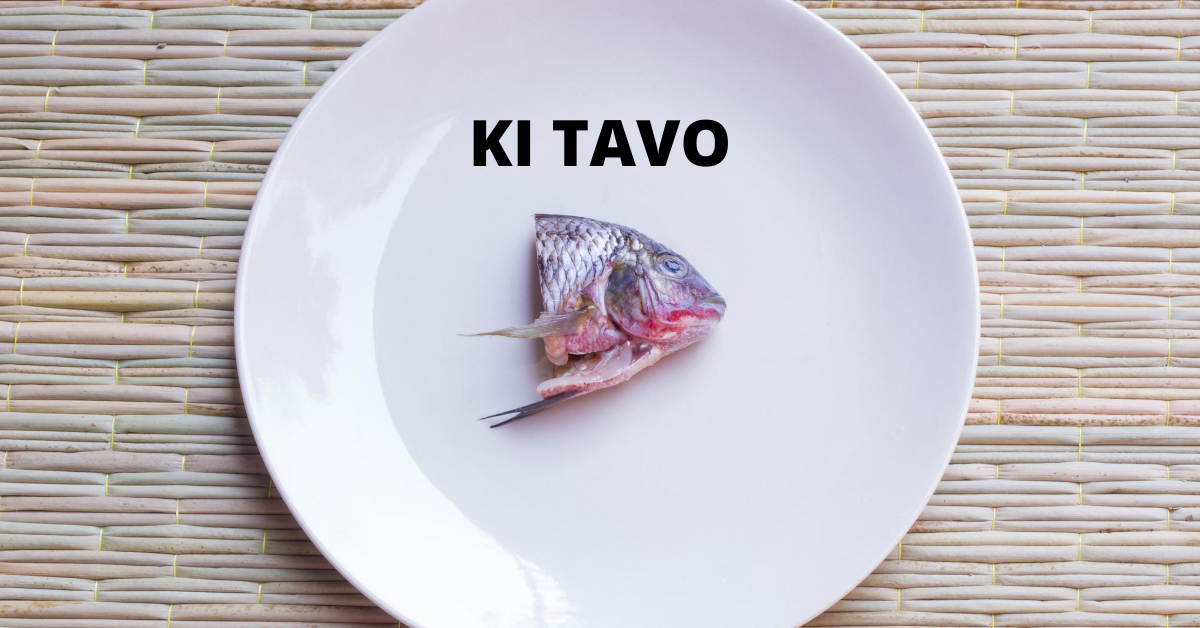This d’var Torah was sponsored by Rabbi Eric Solomon in honor of his and Rabbi Jenny Solomon’s 22nd anniversary.
A d’var Torah for Parshat Ki Tavo by Talia Lavin
A memory: there’s a fish head on the table.
It’s Rosh Hashanah, and those lifeless eyes stare at the collective of mingled families, a lot of kids – I’m among them – who sneak off to play cards. The fish head is always there: its firm cheeks similar to other fish-flesh I’ve eaten, but the beaky, gasping protrusion of its mouth, its circular and absent gaze, are transfixing. There are other traditional foods to eat for luck on Rosh Hashanah – carrots, new fruits – but the fish head isn’t to be consumed but to be seen, a grisly adornment.
The fish head is a direct reference to one of the verses in Parshat Ki Tavo: it is one of the blessings contingent on “diligently” following God’s commandments. “And the ETERNAL will make thee the head, and not the tail.” (Deuteronomy 28:13) It’s a curious blessing, not elaborated upon in the text – although the following blessing in the same verse, “and thou shalt be above only, and not beneath” – suggests a geospatial interpretation, a juxtaposition of lowliness and elevation. I think about a fish tail: brittle, spiny, breakable. Eyeless, mouthless, fleshless, a scaly ridge. At least the head gasped before it was cut off. At least it breathed. So on our New Year we use the head as a symbol of hope. This year, we hope, we will be above, not below.
This curious blessing is emblematic of the bargain laid out in Ki Tavo, although most of the other blessings are more straightforward: you will be blessed in bounty and body, in the barn, the field. You will lend and never borrow; you will prosper and so will your cities and your flocks. Perfect obedience will render perfect plenty. It is widely contended among writers of all kinds that any condition of perfection does not make for compelling prose, and perhaps, for this reason, the bliss of obedience in this covenant is so brief: a mere 14 verses to lay out a conditional vision of plenty, safety, peace. If you do not make a molten image, or sleep with your mother-in-law or a beast, you will glow with abundance. It seems simple. Perhaps it is simple.
But the rest of Ki Tavo, practically, is given over to the curses. To the spiny ridges of the tail, jagged, breakable, denuded of flesh. To what occurs below.
Sign up to receive Torah 20/20 in your inbox each week.
Ki Tavo was my bat mitzvah parshah, and I leined it in front of a small audience of women, in that awkward progressive-but-still-Orthodox liminal space where no rabbi could be present but I could be. One reads the curses – the collective litany, all 54 verses, is called the tokhekha, or rebuke – in a low voice, fast, like the list of potential side effects in a medication commercial, crammed up together in a low buzz. This is the cramped print at the end of a contract, the consequences of violation. They are alive in a way the static images of bounty are not alive; they are inventive; they are horrible. A stranger will be among you and rise; he will be the head, and you will be the tail. The cataclysms that accompany the breaking of the covenant are intricately imagined; not just the inverse of bounty but a remarkably keen exploration of psychological torment. Through the horrors of deprivation, the tender become cruel; mothers consume the flesh of their children in secret. Dispossession – a wife betrothed, then lain with by another; the fruits of one’s fields eaten by strangers; a house built, and never lived in. Every pestilence in the Torah and more, blindness, scabs, itches, the whole catalogue of physical malady. And madness, too; and children in captivity; despair and doubt and exile, a “languishing of the soul.” And all this will take place in a burning crucible: “And thy heaven that is over thy head shall be brass, and the earth that is under thee shall be iron.” An image not just of famine – the earth and the sky, ungiving both – but of an inescapable sphere, the world itself as a prison. Though it is hurried-through when read aloud, it is transfixing to the eye; it has a hypnotic rhythm, arur, arur, arur, cursed, cursed, cursed. The fate it summons evokes conditions worse than death, and death, too, alongside – the death of a pauper, an oathbreaker, a cannibal. A fishtail flung on the midden-heap.
Who would accept this covenant? Who would sign this contract, with its demands of perfect obedience on pain of pain beyond imagining?
Find more commentaries on Parshat Ki Tavo.
We did. Between those mountains – between the mountain of blessings, Gerizim, and the mountain of curses, Ebal – we entered this covenant, with its scant offering of reward, its punishment heavy as a brass heaven. We stood between the mountains and accepted the terms.
Looking down the long and bloody corridor of Jewish history, the tokhekha feels less like a set of conditions and more like prophecy. Seasons and centuries of punishment have come to pass, cannibalism and all. This year of 2020 has offered up more than its share of malady – pestilence, hatred, ruination – and we move to the renewal of the year and the stark choice offered by our politics. Here, amid the pestilence, we stand again between the peaks, renewing the covenant again. We are making the choice again to accept the terms, and earn our immortality by taking on the terrible bargain. The choices we make

can lead us to blessing or curse. But they are ours to make. It is our mantle to assume, every year, but sharper in this year of heavy consequence, of choice as sharp as fishbone.
Talia Lavin is a writer living in New York. She has written about far-right extremism, antisemitism, soup, dumplings and much more in the pages of many publications, including the Washington Post, the New Republic, and GQ. Her debut book, Culture Warlords: My Journey into the Dark Web of White Supremacy, is out from Hachette Books on October 13.

